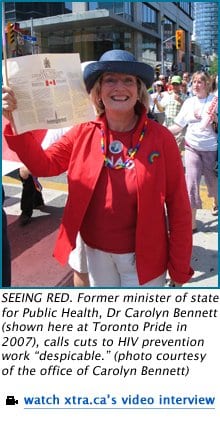Perched on the edge of an overstuffed sofa, Carolyn Bennett crosses her legs.
They stay locked, but as Bennett gets more and more agitated, her hand gestures become increasingly pronounced: pointing, waving, making fists and drawing examples in the air.
She’s been an MP for 10 years and was a cabinet minister once — she was responsible for setting up the Public Health Agency of Canada in 2006 and 2007. During that time, she held the junior minister of state portfolio under health ministers Pierre Pettigrew and Ujjal Dosanjh.
When it comes to gay causes, her first test came shortly after she arrived on the Hill. At the time, she argued that the feds shouldn’t appeal the Rosenberg case, an Ontario pension benefit appeal decided in a gay couple’s favour. In 2000, she raised money to help those charged in connection with the Toronto police raids at Pussy Palace, a women’s bathhouse.
In Ottawa, her office is on the eighth floor of the gray, stone justice building, not part of the three main buildings we commonly think of as Parliament. It’s large and comfortable, if a little off the beaten track.
Like many Liberals MPs, Bennett found herself in opposition for the first time after the January 2006 election. Her frustration is abundantly apparent in her trademark straight-shooting, fiery (if slightly wandering) monologues about the state of the public health file.
“This the most controlling, father-knows-best, top-down micromanaging that any of us have ever seen,” says Bennett. “This government refuses to play nice in this minority Parliament and has declared everything a matter of confidence. So that even to make amendments or change things — in what would normally be a collegial way — is my-way-or-the-highway, take-it-or-leave-it, this-budget-is-perfect-or-the-government-falls.”
Frustrating indeed. But for a woman whose particular parliamentary record skews toward health issues and gay causes, recent cuts to the Public Health Agency of Canada’s (PHAC) programming around AIDS and hepatitis are particularly galling.
“It seems the dumbest thing I have ever heard, when we still have 4,000 new cases a year,” she says. “How on earth can you be cutting the money for prevention? And how could you be cutting the money for people to be able to live with HIV and AIDS with dignity?”
According to AIDS groups, when all the cuts are finished, it will amount to a $7-million hit annually. Community groups, and especially those who do outreach work, will bear the brunt.
“But it is the flavour of this government,” says Bennett. “It’s so telling that these people see community programming as fluffy, feel-good activities for non-profit organizations that they don’t really like and don’t like them. It’s appalling.”
Bennett admits that the Liberals’ promised boost to AIDS funding would never have reached the $100-million target that reformers were looking for. And given that the Liberals were in power during a long period of stagnating funding in the ’90s, the Conservatives are not the only ones implicated by the current crunch.
Over the course of a 45 minute interview, she namedrops at least a half dozen Liberal MPs — including Irwin Cotler, Hedy Fry, Andy Scott, Bill Graham, and Ken Dryden (twice). If the Liberals are planning to contrast Prime Minister Stephen Harper’s shallow cabinet with their own talent pool in the next election, they should consider sending Bennett on a few junkets.
But another handful of names — Casey House, Fife House and Montreal’s Maison Plein Coeur — hint that she’s eager to show AIDS service organizations some respect.
“Almost everything that has worked in this epidemic is community based,” says Bennett, “with the government getting behind what the community knows needs to be done.”
She knows she’s not the only one feeling frustrated by the cuts to HIV groups. In November, she attended a rally on Parliament Hill and spoke to the protesters demanding that Harper pursue “policies that are about better outcomes, not about what would sell in church on Sunday morning.
“And all of us, as activists, are spending all of our time and energy holding on with our fingernails to what we’ve already got instead of trying to move forward,” she says.
That opposition is beginning to coalesce. Service providers from three provinces have rallied around increaseAIDSfunding.ca, which grew out of the Ontario AIDS Network. They’ve started a postcard campaign aimed at protesters’ local MPs and at Tony Clement, the minister of health.
“Ordinarily, if you want resources to your file, it’s good that people are making noise, pushing the healthy public policy that you’re trying to make a priority at the cabinet table,” says Bennett. “There doesn’t seem to be any hope of this now, because it’s all centrally guided by the Prime Minister’s Office.”
“This government has narrow-cast its policies and practices to the people that might ever vote for them and this government is more than willing to write off groups that they think aren’t their supporters and wouldn’t vote for them.”
And that, she says, makes them a “very difficult government to lobby.” The Conservatives often respond to criticism over the Public Health file by pointing at Liberal cuts to the agency under Bennett — to the tune of $15 million. What they’re referring to is Treasury Board “cashflow” shuffling, she insists.
“Those were never cuts,” she says. “We always had every intention of fulfilling our full commitment to the AIDS strategy.”
But politicians must do more, says Bennett, drawing on her medical background to make her argument.
“We have a moral obligation to prevent the preventable. That’s what we do. That was the original goal of medicare, to keep people well, not to just patch them up once they get sick.”


 Why you can trust Xtra
Why you can trust Xtra


